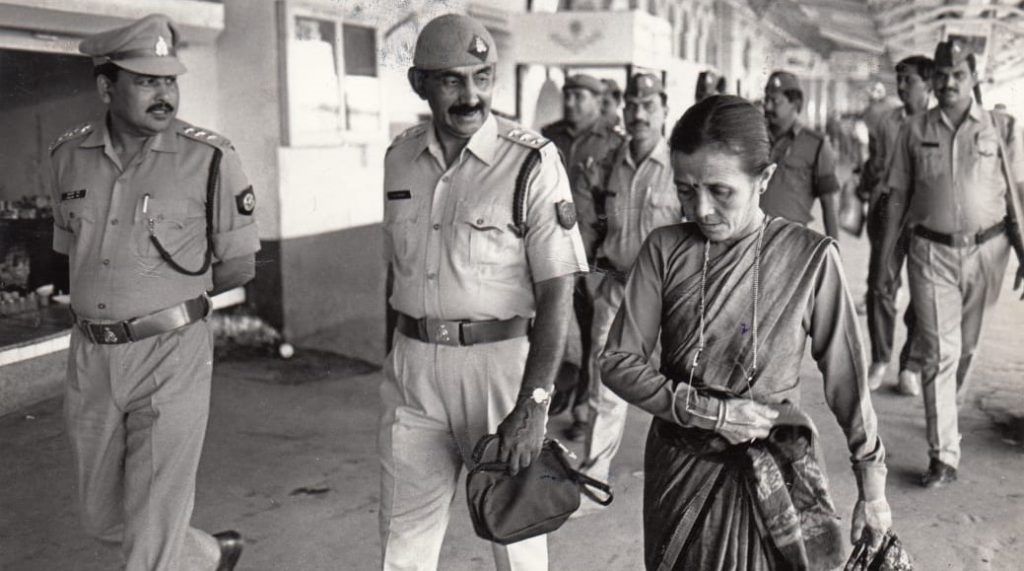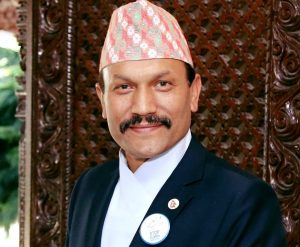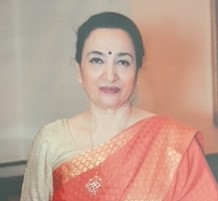Graduated from St. Xavier’s College, Kolkata, India
Mother of Manish Koirala
Established Maiti Nepal in 1993
Won the title of ‘CNN Hero’ in 2010
 I spent most of my childhood in Kalimpong. After finishing high school, I went to Kolkata, where I got my bachelor's degree in history. Soon after graduation, I came to Nepal and started a teaching career.
I taught English for 25 years before I established Maiti Nepal. I founded the organization in 1993 because I wanted to do something about the problem of women and girls. There were a lot of people and organizations that talked about the problem, but very few were actually willing to help the victims of trafficking.
I was 43-year-old and I didn’t have a lot of money. All I had was Rs 30,000. It was all of my savings and the money I got after selling my jewelry.
Maiti Nepal started from a flat with three rooms and a kitchen. I took in trafficking survivors as well as those in need of rescue. The number of survivors kept on increasing as days went by. I had to dedicate my whole time looking after them, so I didn’t have any time to work outside and make money. Funding and donations came much later.
I used to take loans from people I knew to feed sheltered women and children. I don’t even know how I managed to do all that. I did all the work, from cooking to cleaning to washing clothes and dishes. Besides, I also had a son to look after.
We all lived under the same roof. Whatever the challenges, we faced them together. Maiti Nepal continued this way for nearly five years. There was no funding or partner organizations. I was running the organization by myself, until one day an individual from UNICEF told me that they were willing to fund Maiti Nepal. For this, I had to write a proposal. I didn’t know the first thing about writing a proposal. I hadn’t even registered the organization to begin with. It was all so new to me. Thankfully, I knew some people who could help me.
I spent most of my childhood in Kalimpong. After finishing high school, I went to Kolkata, where I got my bachelor's degree in history. Soon after graduation, I came to Nepal and started a teaching career.
I taught English for 25 years before I established Maiti Nepal. I founded the organization in 1993 because I wanted to do something about the problem of women and girls. There were a lot of people and organizations that talked about the problem, but very few were actually willing to help the victims of trafficking.
I was 43-year-old and I didn’t have a lot of money. All I had was Rs 30,000. It was all of my savings and the money I got after selling my jewelry.
Maiti Nepal started from a flat with three rooms and a kitchen. I took in trafficking survivors as well as those in need of rescue. The number of survivors kept on increasing as days went by. I had to dedicate my whole time looking after them, so I didn’t have any time to work outside and make money. Funding and donations came much later.
I used to take loans from people I knew to feed sheltered women and children. I don’t even know how I managed to do all that. I did all the work, from cooking to cleaning to washing clothes and dishes. Besides, I also had a son to look after.
We all lived under the same roof. Whatever the challenges, we faced them together. Maiti Nepal continued this way for nearly five years. There was no funding or partner organizations. I was running the organization by myself, until one day an individual from UNICEF told me that they were willing to fund Maiti Nepal. For this, I had to write a proposal. I didn’t know the first thing about writing a proposal. I hadn’t even registered the organization to begin with. It was all so new to me. Thankfully, I knew some people who could help me.
 After we started getting donations and funding from outside, I was able to hire some people to help me with the work. I still look over everything that goes on in Maiti Nepal, except accounts and finances.
Once the funds started flowing, we were also able to add another shelter. Meanwhile, the number of survivors also increased massively, particularly after the Mumbai rescue in 1996. While the rescued survivors were sent to other organizations too, it was Maiti Nepal that took in the largest number of them.
Running a shelter doesn’t just mean providing food and a place to stay to the survivors. It also means creating an environment where the rescued individuals could feel welcome and safe. Many trafficking survivors go through unimaginable pain and trauma, and as a result, some of them pick up bad habits like smoking and drinking.
I was a teacher for 25 years and if you ask any student of mine, they will tell you how strict I was. I was the same with trafficking survivors when it came to making them quit their bad habits. Although I treated them with love and respect, I didn’t tolerate their bad habits. It took a lot of patience, but they did quit eventually.
I have always wanted to work for women and children, so I feel extremely lucky that I was able to live my dream. When I got nominated for the CNN Hero award for my work through Maiti Nepal, I didn’t even know that I was on the list of nominees. Winning the award was both a joyful and humbling occasion for me. On one hand, Maiti Nepal was getting global recognition, and on the other, I felt the burden of responsibility on my shoulder had been increased. I feel the same sense of added responsibility with every award and recognition. They add the pressure of doing more and doing better everyday. Maybe it’s a good thing? I don’t know.
All I can say is, from the moment I established Maiti Nepal 30 years ago, I have worked with a singular goal of making Nepal free from women and girl trafficking. I am 73 now and I am still striving towards that goal. The fight is not over when it comes to women’s rights. It is a shame that we still haven’t been able to protect our women and children. So I have to keep on fighting.
About her
Bishwo Ram Khadka (Colleague)
After we started getting donations and funding from outside, I was able to hire some people to help me with the work. I still look over everything that goes on in Maiti Nepal, except accounts and finances.
Once the funds started flowing, we were also able to add another shelter. Meanwhile, the number of survivors also increased massively, particularly after the Mumbai rescue in 1996. While the rescued survivors were sent to other organizations too, it was Maiti Nepal that took in the largest number of them.
Running a shelter doesn’t just mean providing food and a place to stay to the survivors. It also means creating an environment where the rescued individuals could feel welcome and safe. Many trafficking survivors go through unimaginable pain and trauma, and as a result, some of them pick up bad habits like smoking and drinking.
I was a teacher for 25 years and if you ask any student of mine, they will tell you how strict I was. I was the same with trafficking survivors when it came to making them quit their bad habits. Although I treated them with love and respect, I didn’t tolerate their bad habits. It took a lot of patience, but they did quit eventually.
I have always wanted to work for women and children, so I feel extremely lucky that I was able to live my dream. When I got nominated for the CNN Hero award for my work through Maiti Nepal, I didn’t even know that I was on the list of nominees. Winning the award was both a joyful and humbling occasion for me. On one hand, Maiti Nepal was getting global recognition, and on the other, I felt the burden of responsibility on my shoulder had been increased. I feel the same sense of added responsibility with every award and recognition. They add the pressure of doing more and doing better everyday. Maybe it’s a good thing? I don’t know.
All I can say is, from the moment I established Maiti Nepal 30 years ago, I have worked with a singular goal of making Nepal free from women and girl trafficking. I am 73 now and I am still striving towards that goal. The fight is not over when it comes to women’s rights. It is a shame that we still haven’t been able to protect our women and children. So I have to keep on fighting.
About her
Bishwo Ram Khadka (Colleague)
 I have worked with her for a long time now, and I have never seen anyone as disciplined and sincere as her. She is a rare individual. Her goal has always been to free Nepal from human trafficking and she has never stopped working on it. Her work is truly remarkable.
Meera Ratna (Friend)
I have worked with her for a long time now, and I have never seen anyone as disciplined and sincere as her. She is a rare individual. Her goal has always been to free Nepal from human trafficking and she has never stopped working on it. Her work is truly remarkable.
Meera Ratna (Friend)
 I have known Anu since our school days. She always had a keen interest in social work and I have seen her be a part of many social works. She was always looking to help people. I am proud of work and everything she has achieved.
Dr Samjhana Pokhrel (Student)
I have known Anu since our school days. She always had a keen interest in social work and I have seen her be a part of many social works. She was always looking to help people. I am proud of work and everything she has achieved.
Dr Samjhana Pokhrel (Student)
 I was a child when I first met Dijju in 2002. One thing I really love about her is that she has always been supportive of what I wanted to study. Not just me but all the other children in Maiti Nepal. Even when there are so many children, she managed to remember all of our interests. I don’t know how she did it, but I am grateful for everything she has done for us.
I was a child when I first met Dijju in 2002. One thing I really love about her is that she has always been supportive of what I wanted to study. Not just me but all the other children in Maiti Nepal. Even when there are so many children, she managed to remember all of our interests. I don’t know how she did it, but I am grateful for everything she has done for us.











